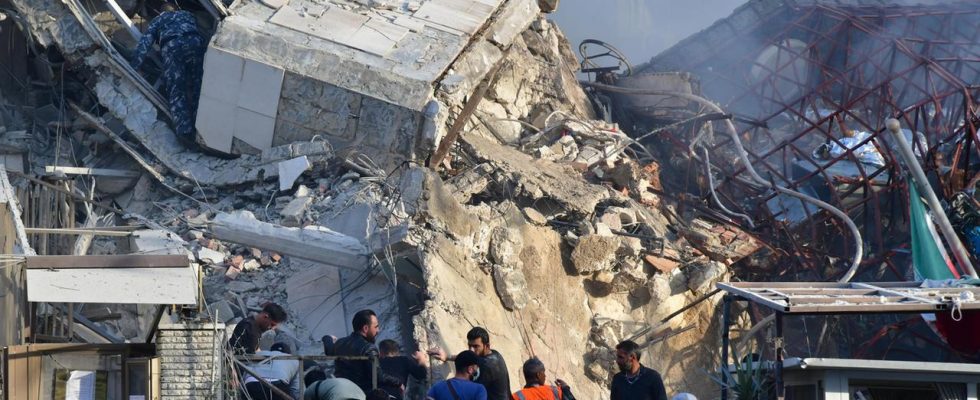After the suspected Israeli attack on the Iranian embassy in Syria, concerns are growing about an escalation in the Middle East conflict. What happened, what could be the reasons – and what reactions are there from Tehran?
What happened?
According to the Iranian Revolutionary Guard, seven of its members were killed in an air strike on a consular building at the Iranian embassy in the Syrian capital Damascus on Monday. They also include two senior representatives of the Al-Quds Brigades, commanders Mohammed Reza Sahedi and Mohammed Hadi Haji Rahimi, the organization said.
According to the Syrian Observatory for Human Rights, a total of eleven people died in the attack. “Eight Iranians, two Syrians and one Lebanese – all fighters, no civilians,” the head of the Observatory, Ramy Abdoulrahman, told AFP.
The completely destroyed and collapsed consular section is an annex to the Iranian embassy, located in the upscale Masseh district. Iran’s ambassador to Syria, Hossein Akbari, was unhurt in the attack.
Akbari said on Iranian state television that the attack was carried out by F-35 fighter jets. According to the Syrian Defense Ministry, the shelling came from the Israeli-occupied Golan Heights.
What could be the reasons for the attack?
There is no official statement from Israel: Israeli army spokesman Daniel Hagari said at a press conference in response to a question about the attack that he does not comment on information from the foreign press. Israel generally rarely comments on its attacks in Syria, but has repeatedly said it will not tolerate an expansion of Iran’s presence in Syria.
“It is clear that Israel is carrying out these attacks because they see what is happening in Lebanon and Syria,” Ramy Abdoulrahman of the Syrian Observatory for Human Rights told Saudi broadcaster al-Hadath. “This attack is a continuation of other attacks on Iranian personnel in this region. It is intended to unsettle Hezbollah and others.”
The government in Tehran has seen itself as Israel’s archenemy for decades and controls or supports various militias in the region, including in Syria.
The Quds Force, which was primarily hit in the current attack, is an elite unit of the Iranian Revolutionary Guard that specializes in foreign operations. According to experts, they are supposed to coordinate cooperation with pro-Iranian militias such as the Lebanese Hezbollah in Syria, Lebanon and Iraq.
Israel’s air force repeatedly bombs targets in neighboring Syria in an attempt to prevent Iran and its allied militias such as Hezbollah from expanding their military influence in the country. Attacks have increased since the war between Israel and the Hezbollah-allied militant Islamist organization Hamas began on October 7.
What does Tehran say?
Iran’s President Ebrahim Raisi strongly condemned the attack and spoke in a statement of it being a terrorist crime in gross violation of international regulations, the state news agency Irna reported. “This dastardly crime will not go unanswered,” the statement continued.
Iranian Foreign Minister Hossein Amir-Abdollahian announced a “firm response.” Lebanon’s Iran-backed Hezbollah militia announced “punishment and revenge” for Israel over the attack.
Iran’s foreign minister also summoned the Swiss envoy. Since Washington does not have a diplomatic mission in Iran, the Swiss head of mission acts as the US representative in Tehran. As Israel’s main supporter, “the Americans must take responsibility,” Amir-Abdollahian said, according to state news agency Irna.
Is there a risk of further escalation of the conflict?
Experts expressed concern that some in Iran could see the attack as a declaration of war. “If it hits an annex of the Iranian embassy, i.e. a rocket hits directly on Iranian soil, then Israel will almost force Iran to respond,” believes Ramy Abdoulrahman from the Syrian Observatory for Human Rights. “It could be that Hezbollah, for example, strikes and interprets this as a reaction to the attack.”
However, how and whether Iran’s state power will react is still an open question. At the end of December, Iranian General Sejed-Rasi Mousavi, a senior member of the Revolutionary Guard, was killed in a suspected Israeli airstrike in a suburb of the Syrian capital Damascus. Iran’s Revolutionary Guards responded in mid-January with massive rocket attacks in retaliation against targets in Syria and Iraq. The rockets flew around 1,200 kilometers.
In the Iranian capital Tehran, hundreds of government supporters gathered in the city center late on Monday evening for spontaneous protests, eyewitnesses reported. The crowd demanded revenge for the killing of the generals. They shouted, among other things, “Death to Israel” and “Death to America.”
With information from Tilo Spanhel, ARD Cairo
Uwe Lueb, ARD Istanbul, tagesschau, April 2nd, 2024 8:52 a.m

